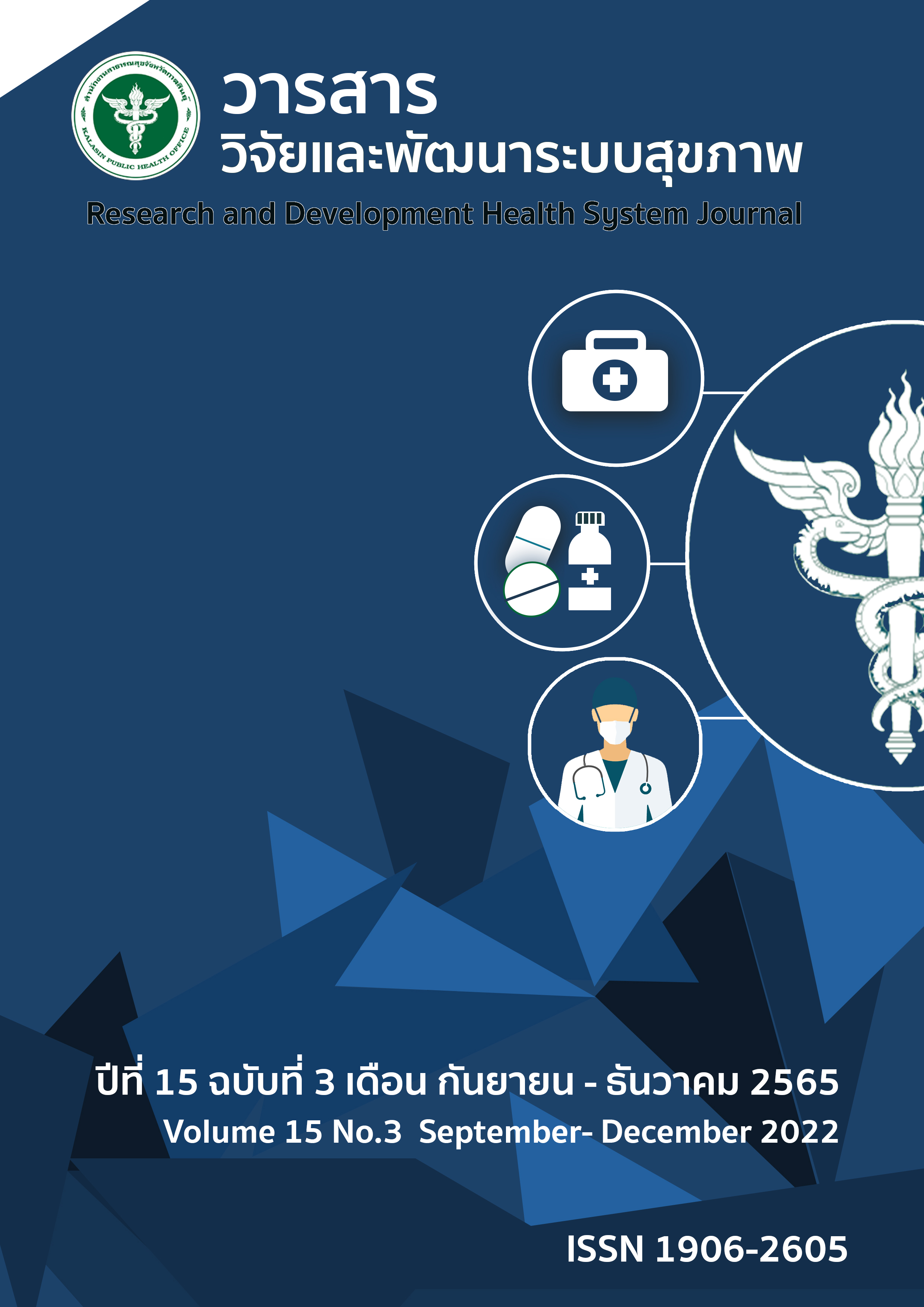คุณภาพชีวิตของผู้ดูแลเด็กปฐมวัยที่มีพัฒนาการล่าช้า
คำสำคัญ:
คุณภาพชีวิต, ผู้ดูแลเด็ก, เด็กปฐมวัย, พัฒนาการล่าช้าบทคัดย่อ
เด็กที่มีพัฒนาการล่าช้าจำเป็นต้องได้รับการเลี้ยงดูและกระตุ้นพัฒนาการอย่างสม่ำเสมอ ส่งผลต่อผู้ดูแลทั้งร่างกาย จิตใจ อารมณ์และสังคม การศึกษาครั้งนี้มีวัตถุประสงค์ เพื่อศึกษาคุณภาพชีวิตของผู้ดูแลเด็กปฐมวัยที่มีพัฒนาการล่าช้า และปัจจัยที่มีความสัมพันธ์กับคุณภาพชีวิต กลุ่มตัวอย่าง คือ ผู้ดูแลหลักของเด็กปฐมวัยทุกรายที่มีพัฒนาการล่าช้า ที่รักษา ณ กลุ่มงานเวชกรรมฟื้นฟู โรงพยาบาลพัทลุง จำนวน 74 ราย เก็บข้อมูลจากเวชระเบียน แบบบันทึกข้อมูลผู้ดูแลเด็กและเด็ก แบบสอบถามคุณภาพชีวิตขององค์การอนามัยโลก ชุดย่อฉบับภาษาไทย (WHOQOL- BREF-THAI) และแบบประเมินภาวะซึมเศร้าฉบับภาษาไทย (Thai HADS) วิเคราะห์ข้อมูลด้วยสถิติเชิงพรรณนา และ
Chi-square test
ผลการวิจัย พบว่า ผู้ดูแลเด็กปฐมวัยที่มีพัฒนาการล่าช้าส่วนใหญ่มีคุณภาพชีวิตคุณภาพชีวิตโดยรวมอยู่ในระดับดี ร้อยละ 55.40 และปัจจัยที่มีความสัมพันธ์กับคุณภาพชีวิต ได้แก่ ความเพียงพอของรายได้ และจำนวนชั่วโมงที่ใช้ในการดูแลเด็กต่อวัน
การวิจัยครั้งนี้ พบว่า การดูแลเด็กปฐมวัยที่มีพัฒนาการล่าช้าส่งผลกระทบต่อคุณภาพชีวิตของผู้ดูแลในทุกด้าน และปัจจัยที่สัมพันธ์กับคุณภาพชีวิตนั้นเป็นปัจจัยของผู้ดูแลทั้งสิ้น ดังนั้น การให้ความช่วยเหลือผู้ดูแลเด็กจัดเป็นแนวทางหนึ่งที่ช่วยให้คุณภาพชีวิตของผู้ดูแลเด็กดีขึ้น ทำให้เด็กได้รับการดูแลที่เหมาะสมและดีขึ้น
Downloads
เอกสารอ้างอิง
Orley J, Kuyken W. The development of the World Health Organization quality of life assessment instrument (the WHOQOL). In: WHOQoL Group, editor. Quality of life assessment: International perspectives. Heidelberg: Springer; 1994. P.41-57.
Nanthamongkolchai S. Family, Child rearing and Development of Preschoolers in Thailand. Journal of Public Health 2016; 46(3): 205-10. [In Thai]
Jintana P, Wanwisa K. The 6th study of factors affecting the development of early childhood in Thailnad, 2017. Health promotion Bureau, Ministry of Public Health; 2018. [In Thai]
Department of Health, Ministry of Public Health. Growth and development of preschool children 2007. Nonthaburi: Bureau of Health Promotion, Ministry of Public Health, 2009. [In Thai]
Sirithongthaworn S. Developmental Surveillance and Promotion Manual; DSPM. J Psychiatr Assoc Thailand 2018; 63(1): 3-12. [In Thai]
Choomai T. Development of Early Childhood. Hua Hin Sook Jai Klai Kangwon Journal 2016; 2: 18-33. [In Thai]
Health Promotion Bureau. Surveying Early Child Development Report 2010. Bangkok: Bureau of Health Promotion, Department of Health, Ministry of Public Health, 2011.
Bureau of Inspection and Evaluation Office of the Permanent Secretary, Ministry of Public Health. Situation Thai Child Development Fiscal Year 2014. Bangkok: TS Interprint Co, Ltd. 2015.
Mother and Child health Board, Health Promotion Bureau. Surveying Early Child Development Report 2010. Bangkok: Bureau of Health Promotion, Ministry of Public Health, 2015.
Keuaid N, Sangthong J, Chaimay P, et al. Prevalence of child development delay among children aged under 5 years old in Phatthalung province. Journal of Health Science 2019; 28(2): 215-23. [In Thai]
Department of Health, Ministry of Public Health. Thai Child Development(Region 12) [Internet] 2019 [cited 2020 April 17]. Available from: http//healthkpi.moph.go.th?kpiyear=2562.
Leung CY, Li-Tsang CW. Quality of life of parents who have children with disabilities. Hong Kong J Occup Ther. 2003;13(1):19-24.
Singh K, Kumar P, Kumar R, Chakarborti S. Quality of Life Among Parents of Childrend with Intellectual Disability. Journal of Disability Management and Rehabilitation 2017;2(1):13-7.
Isaranurug S, Nanthamongkolchai S, Kaewsiri D. Factors Influencing development of children aged one to under six years old. J Med Assoc Thai 2005; 88: 86-90.
Hayeemasae K, Sangsupawanitch P, Parinyasutinun U. Comparative study on social support of caregivers of children with autism spectrum disorder and caregivers of typical development children in Songklanagarind hospital. Research for the development of Thai society 2013; 4: 113-7. [In Thai]
Chantarathip P. Factors predicting stress in caring for mothers with autistic children. The Journal of Faculty of Nursing Chiang Mai University 2014; 13(2), 15-23. [In Thai]
Breslau N. Psychological distress in mothers of disabled children. American Journal of Disabled Child.1982;136:682-6.
Wanicharoen N. Quality of Life among Caregivers of Children with Language Impairment at the Division of Developmental and Behavioral. Vajira Medical Journal: Journal of Urban Medicine 2021; 65(4): 320-31. [In Thai]
Khoonrungsrisomboon K. Quality of Life of Parents of Children with Delayed Development. Bullentin of Suanprung 2012; 28(1): 5-16. [In Thai]
Charatcharungkiat N, Wacharasindhu A. Quality of Life among Caregivers of Children with Autistic Spectrum Disorders and Associated Factors. J Psychiatr Assoc Thailand 2013; 58(3): 233-44. [In Thai]
Kumari R, Luitel I, Regmi K. Evaluating Quality of Life of Parents Having a Child with Disability. Journal of Karnali Academy of Health Sciences 2020; 3(1): 25-34.
Orapiriyakul R, Benjakul W, Kwunkaew S. Predictor of burden of care in primary family caregivers of children with autism in the west-coast southern Thailand. Journal of Faculty of Nursing, Prince of Songkla University 2014; 34(3), 39-55. [In Thai]
Juntratip P, Pongjaturawit Y, Chaimongkol N. Factors Influencing Burden of Child Caregivers of Children with Delayed Development. The Journal of Faculty of Nursing Burapha University 2020; 28(2), 52-63. [In Thai]
Wakimizu R, Yamaguchi K, Fujioka H. Family empowerment and quality of life of parents raising children with Developmental Disabilities in 78 Japanese families. International Journal of Nursing Sciences 2017;4(1):38-45.
Nishii M, Yamada K, Morioka I. Factors affecting Quality of Life of mothers rearing the infant commuting to a developmental support center. J Child Health 2015;74(6):948-58.
Mahatnirunkul S, Tuntipivatanakul W, P u m p i s a n c h a i W, et al. Comparison of the WHOQOL-100 and the WHOQOL-BREF (26 times). Jornal of Mental Health of Thailand 1998; 5:4-15. [In Thai]
Nilchaikovit T, Lortrakul M, Phisansuthideth U. Development of Thai version of Hospital Anxiety and Depression Scale. Journal of the Psychiatrist Association of Thailand 1996; 41(1): 18-30. [In Thai]
ดาวน์โหลด
เผยแพร่แล้ว
รูปแบบการอ้างอิง
ฉบับ
ประเภทบทความ
สัญญาอนุญาต
ลิขสิทธิ์ (c) 2022 วารสารวิจัยและพัฒนาระบบสุขภาพ

อนุญาตภายใต้เงื่อนไข Creative Commons Attribution-NonCommercial-NoDerivatives 4.0 International License.
เนื้อหาและข้อมูลในบทความที่ลงตีพิมพ์ในวารสารศูนย์ดัชนีการอ้างอิงวารสารไทย ถือเป็นข้อคิดเห็นและความรับผิดชอบของผู้เขียนบทความโดยตรงซึ่งกองบรรณาธิการวารสาร ไม่จำเป็นต้องเห็นด้วย หรือร่วมรับผิดชอบใด ๆบทความ ข้อมูล เนื้อหา รูปภาพ ฯลฯ ที่ได้รับการตีพิมพ์ในวารสารศูนย์ดัชนีการอ้างอิงวารสารไทย ถือเป็นลิขสิทธิ์ของวารสารศูนย์ดัชนีการอ้างอิงวารสารไทย หากบุคคลหรือหน่วยงานใดต้องการนำทั้งหมดหรือส่วนหนึ่งส่วนใดไปเผยแพร่ต่อหรือเพื่อกระทำการใด จะต้องได้รับอนุญาตเป็นลายลักณอักษรจากวารสารศูนย์ดัชนีการอ้างอิงวารสารไทยก่อนเท่านั้น







